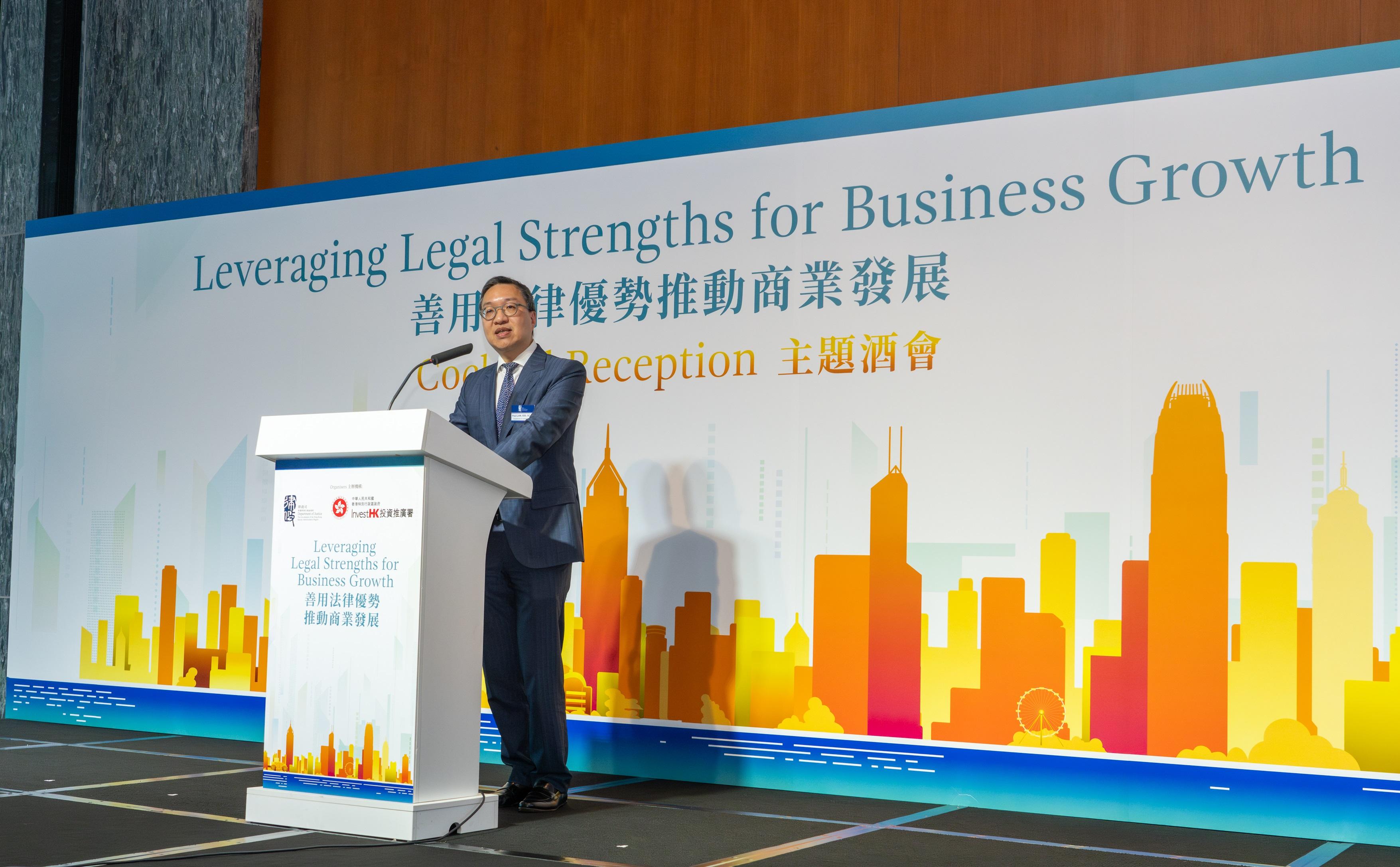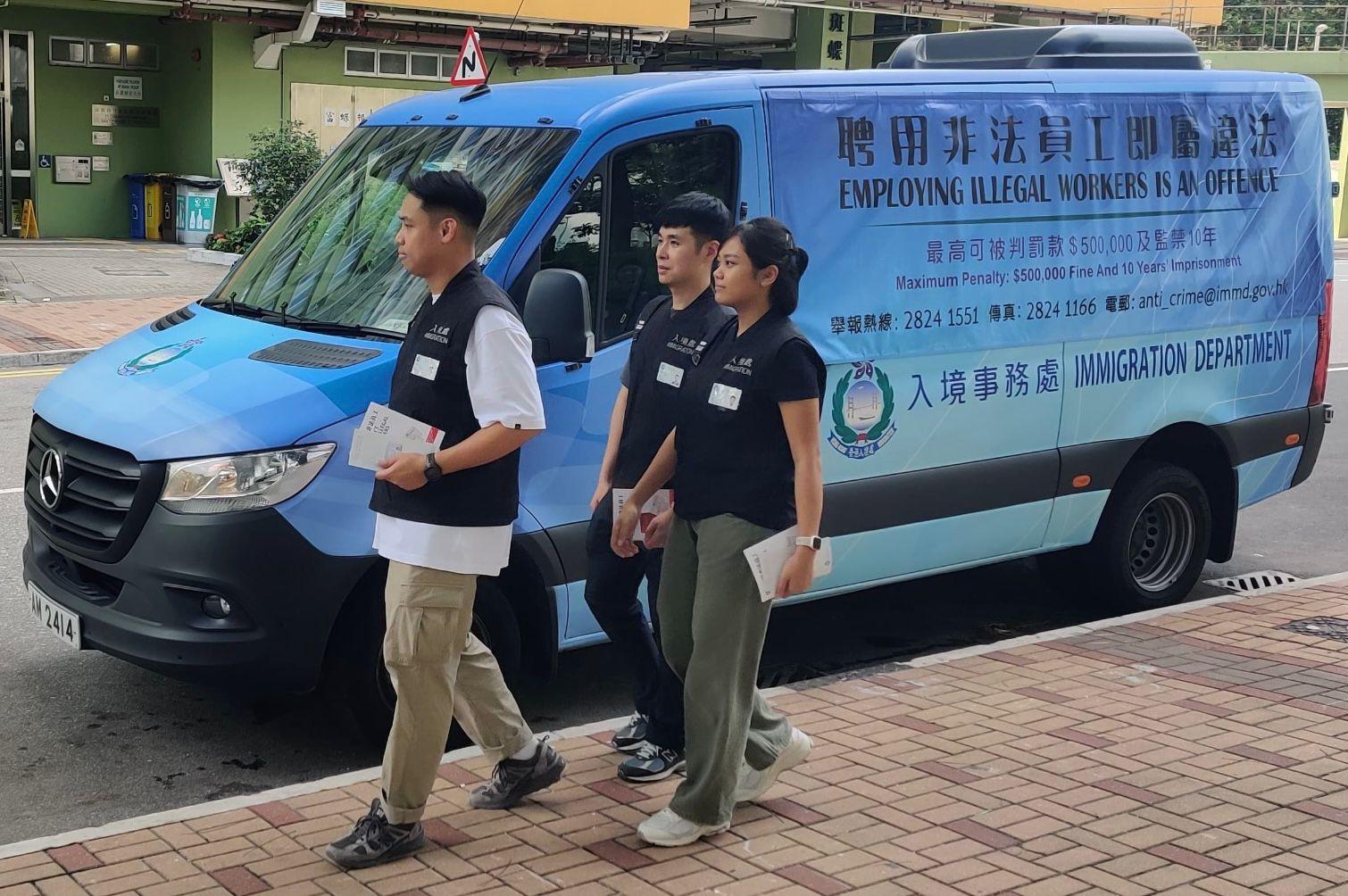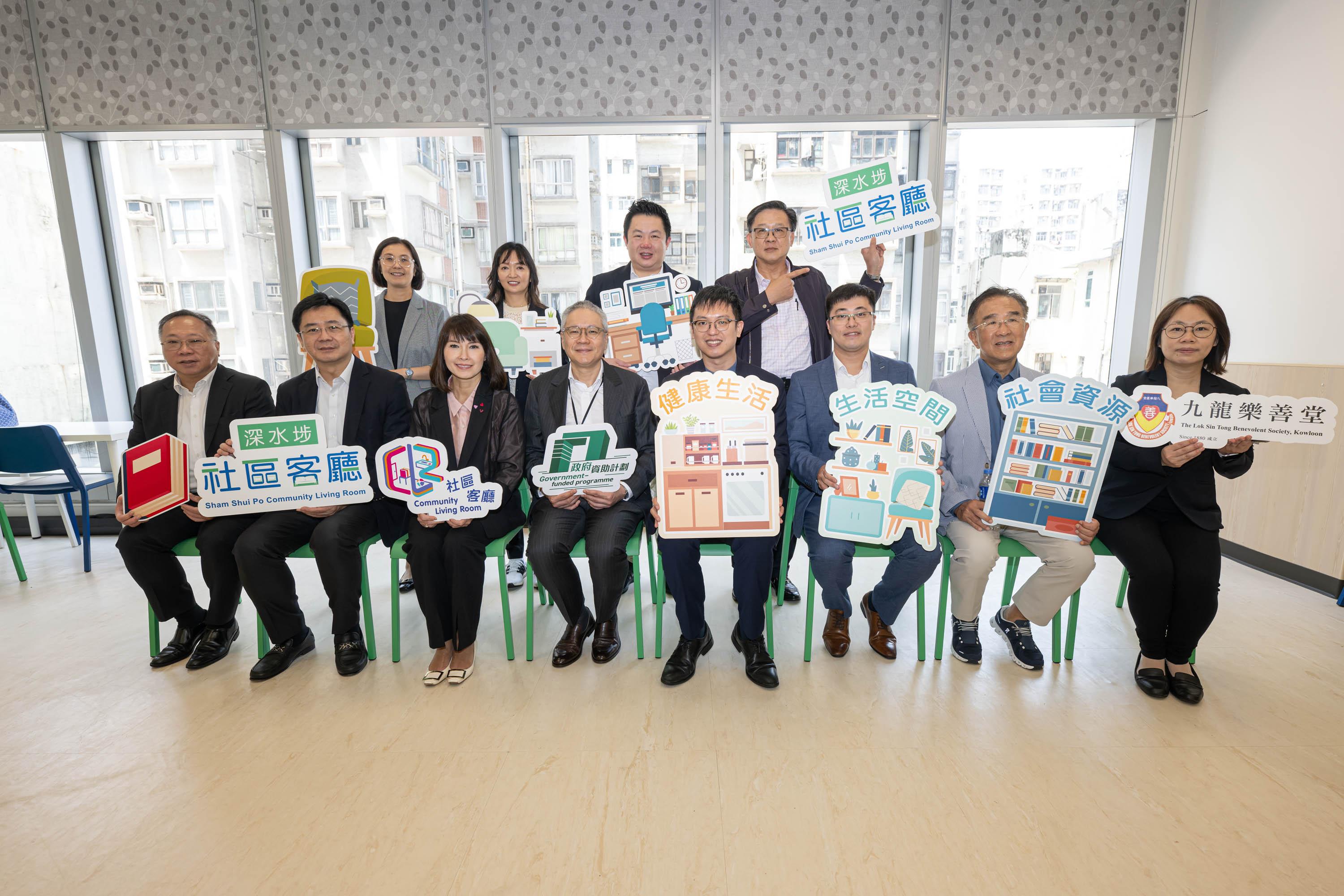Speech by SJ at Leveraging Legal Strengths for Business Growth Cocktail Reception (English only) (with photo)
Following are the welcome remarks by the Secretary for Justice, Mr Paul Lam, SC, at the Leveraging Legal Strengths for Business Growth Cocktail Reception today (May 6):
Ms Lau (Director-General of Investment Promotion at Invest Hong Kong, Ms Alpha Lau) distinguished guests, ladies and gentlemen,
Good evening, and a very warm welcome to all of you, especially to our overseas guests and guests from the Mainland visiting Hong Kong to attend the 26th ICCA Congress.
Today’s reception is a side event jointly organised by the Department of Justice and Invest Hong Kong, with the theme “Leveraging Legal Strengths for Business Growth”. We are excited to have over 200 guests from the business sector and also the legal and dispute resolution sector from Hong Kong and around the world with us this evening. We hope to provide an opportunity to all those attending to reconnect and make new friends, and to gain firsthand information about the legal developments in Hong Kong.
Hong Kong is undoubtedly an international trade and financial centre. Facts and figures speak for themselves. Hong Kong’s economy remains strong and continues to grow as an ideal place for doing business. Hong Kong’s economy grew by 3.2 per cent last year, and we forecast a growth of 2.5 per cent to 3.5 per cent for 2024. Our inflation rate remained at a low rate of 1.7 per cent, with an unemployment rate just around 3 per cent. Hong Kong recorded over 11.23 million visitors in the first quarter this year, representing a 1.5 times year-on-year increment. The presence of our overseas visitors here today, adds on to our estimation of 50 million tourists for the year.
Hong Kong’s success as an international trade and financial centre is made possible by its robust and reliable legal system. Under the principle of “one country, two systems”, Hong Kong retains its common law system and is the only common law jurisdiction within China. Hong Kong, with our strong legal traditions as well as an impartial, independent and transparent judicial system, provides individuals and business entities with certainty, predictability, and also a level playing field that is well-regarded internationally.
Under the national development plans of China, Hong Kong shall act as an international legal and dispute resolution services centre. We have a very strong pool of legal professionals experienced in international commercial matters who would assist their clients to set up family offices, or joint ventures in different forms in Hong Kong; and to implement M & A (mergers and acquisitions) and IPO (initial public offerings) projects, etc.
Dispute resolution is of course another strength of Hong Kong. This is why the Department of Justice fully supports the HKIAC (Hong Kong International Arbitration Centre) in hosting the 26th ICCA Congress. I said last evening at the opening ceremony of the ICCA Congress that more than 1 300 participants have registered for the event. But Justin (Co-Chair of the ICCA 2024 Hong Kong Host Committee Mr Justin D’Agostino) just told me that the figure, for some reason, has reached 1 400 and obviously some people had decided to register after the commencement of the programme, which is quite exceptional. But I said, never mind so long as they pay. I think that the number of participants is extremely impressive and beyond our expectation. I think that is the best evidence that Hong Kong remains an utmost attractive place for people and legal professionals from all parts of the world. Now, being a global business hub and also a leading centre for international arbitration, there is every reason for the Congress to be held in Hong Kong.
Arbitration is a mode of dispute resolution based on the voluntary agreement of the contracting parties. Although in practice the mode of dispute resolution is unlikely to be at the forefront of the minds of the contracting parties, it is indeed an essential part of risk management. From the perspective of the business community, in the unfortunate event that a dispute with the other party arises in future, it must be essential to ensure that the dispute can be resolved in a fair, speedy, economical and effective manner. Let me take this opportunity to summarise very briefly why arbitration in Hong Kong would satisfy these essential criteria.
Resolving commercial disputes can be costly. To address the concern in this respect, Hong Kong has maximised the funding options for arbitrations. In December 2022, we introduced the regime on outcome-related fee structures for arbitration (ORFSA) for arbitration parties and their lawyers to negotiate the fee arrangements best suited to their needs. Coupled with the third party funding of the arbitration regime introduced back in 2019, the availability of funding options and flexibility in fee arrangements would benefit arbitration parties and their lawyers.
There cannot be any doubt that arbitrations in Hong Kong are always conducted in a fair manner. The best evidence is that Hong Kong is always one of the most preferred seats for arbitration in the world, which is a reflection of people’s high degree of trust and confidence in arbitrations in Hong Kong. We have leading arbitral institutions in Hong Kong such as the HKIAC. Arbitrators are invariably eminent and experienced legal professionals including retired judges from not just Hong Kong but also other jurisdictions. Furthermore, the arbitral proceedings are subject to the supervision of our independent judiciary. Under the Basic Law, the Hong Kong court exercises independent power of adjudication, including that of final adjudication.
Resolving commercial disputes can be time consuming. Arbitration is, generally speaking, less time consuming than litigation because an arbitral award is not subject to any appeal and, in theory, final and conclusive. In other words, arbitration is meant to be a one-stop process. What is significant is that the Hong Kong court adopts a very pro-arbitration attitude so that they will only intervene in the arbitral process or set aside an arbitral award in wholly exceptional circumstances.
Whether an arbitral award can be effectively enforced is, of course, of crucial importance. An arbitral award will only be a piece of useless paper if it cannot be enforced. Arbitral awards made in Hong Kong are enforceable in Hong Kong and over 170 Contracting Parties to the New York Convention. An additional strength about Hong Kong, which is not shared by other places, is that we have concluded nine arrangements on mutual legal assistance in civil and commercial matters (with the Mainland), and three of them concern arbitration-related assistance including not only the enforcement of arbitral awards but also the grant of interim measures for preserving assets, evidence and conduct pending the conclusion of the arbitration.
The wide range of legal services, including dispute resolution services, offered by Hong Kong enable Hong Kong to play the role as a “super connector” and a “super value-adder” between the Mainland and other countries in particular under the national policies of the Belt and Road Initiative and the Greater Bay Area (Guangdong-Hong Kong-Macao Greater Bay Area) Development Plan. In particular, the Greater Bay Area is a nine-plus-two megalopolis, encompassing nine cities in Guangdong plus Hong Kong and Macao, with a population of over 86 million and an estimated GDP of US$1.7 trillion. The legal services provided by Hong Kong would allow overseas investors and businessmen to explore investment and business opportunities in the Mainland while having the option of safeguarding their interests by making use of the Hong Kong common law system, which is trustworthy and familiar to the international community.
Lastly, on a lighter note, for those visiting Hong Kong for the first time, and even for those who have been here before, no matter for how many times, I would strongly encourage you to take the opportunity to immerse yourself in Hong Kong’s rich and vibrant culture. There are, of course, this reception and many other side events around the ICCA Congress. The Asia Society where we are now is actually the place for the Former Explosives Magazine of the Old Victoria Barracks in Hong Kong, is of a very unique historical value and very worth exploring. I would also recommend that you visit one of Hong Kong’s most significant landmarks – the West Kowloon Cultural District, which is one of the largest cultural projects in the world that raises Hong Kong’s status as an arts and culture hub connecting the world. You can easily spend a day at the Hong Kong Palace Museum. There is an excellent exhibition concerning the Yuan Ming Palace; that’s the palace that had been destroyed during the Opium War. It is very interesting, no matter what you look at, from a matter of history or art and culture, and you can easily spend a day in that area. But you have to attend the conferences first before having drinks, parties and all the cultural projects. I do hope that apart from speaking on matters of great practical importance, legal matters, business opportunities, you will find some time to enjoy Hong Kong, because I was born here, I grew up here. I really love Hong Kong. I am sure that people who have been here will easily share the same love and affection for Hong Kong. So I encourage you to enjoy your time, to maximise your time in Hong Kong.
Before I conclude, thank you again for joining us at the reception. My appreciation also goes to Invest Hong Kong for co-organising this event. Ladies and gentlemen, have a pleasant evening and an enjoyable stay in Hong Kong. Thank you very much.







